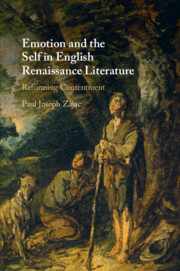Book contents
- Emotion and the Self in English Renaissance Literature
- Emotion and the Self in English Renaissance Literature
- Copyright page
- Dedication
- Contents
- Acknowledgments
- Introduction
- Chapter 1 Constructing Contentment in Reformation England
- Chapter 2 Romancing Contentment
- Chapter 3 Fashioning Contentment
- Chapter 4 Performing Contentment
- Chapter 5 Losing Contentment
- Conclusion
- Notes
- Bibliography
- Secondary Sources
- Index
Chapter 3 - Fashioning Contentment
Ethics, Emotion, and Literary Mode in Spenser’s Poetry
Published online by Cambridge University Press: 15 December 2022
- Emotion and the Self in English Renaissance Literature
- Emotion and the Self in English Renaissance Literature
- Copyright page
- Dedication
- Contents
- Acknowledgments
- Introduction
- Chapter 1 Constructing Contentment in Reformation England
- Chapter 2 Romancing Contentment
- Chapter 3 Fashioning Contentment
- Chapter 4 Performing Contentment
- Chapter 5 Losing Contentment
- Conclusion
- Notes
- Bibliography
- Secondary Sources
- Index
Summary
Chapter 3 redirects the scholarly trend of characterizing Spenser’s works as defined by personal and political discontent, and it instead examines their relationship to sixteenth-century models of contentedness. This study of The Faerie Queene and the Complaints volume demonstrates that Spenser privileges a situational contentment. In Book I, neither Red Cross nor Una can maintain contentment at all times, but the emotion punctuates experiences like productive sadness and pious anger, and it protects against overly destructive passions. While Book I presents contentedness coexisting with other emotions, Mother Hubberds Tale imagines an uneasy alliance between contentment and complaint. Finally, through the character of Melibee in Book VI, Spenser makes his most explicit case for contentment, yet it is embedded in an episode that emphasizes the sway of sexual desire and the intense threat it can pose when unrestrained. In his last concerted representation of contentment, Spenser emphasizes its appeal and fragility. Thus, Chapter 3 highlights the affective continuities between the 1590 and 1596 Faerie Queene, and between Spenser’s major and minor works.
Keywords
- Type
- Chapter
- Information
- Emotion and the Self in English Renaissance LiteratureReforming Contentment, pp. 76 - 100Publisher: Cambridge University PressPrint publication year: 2022

